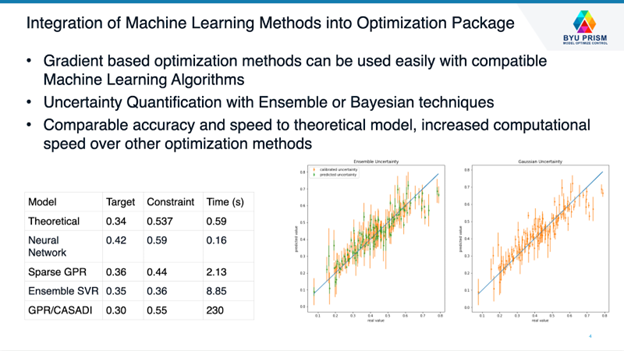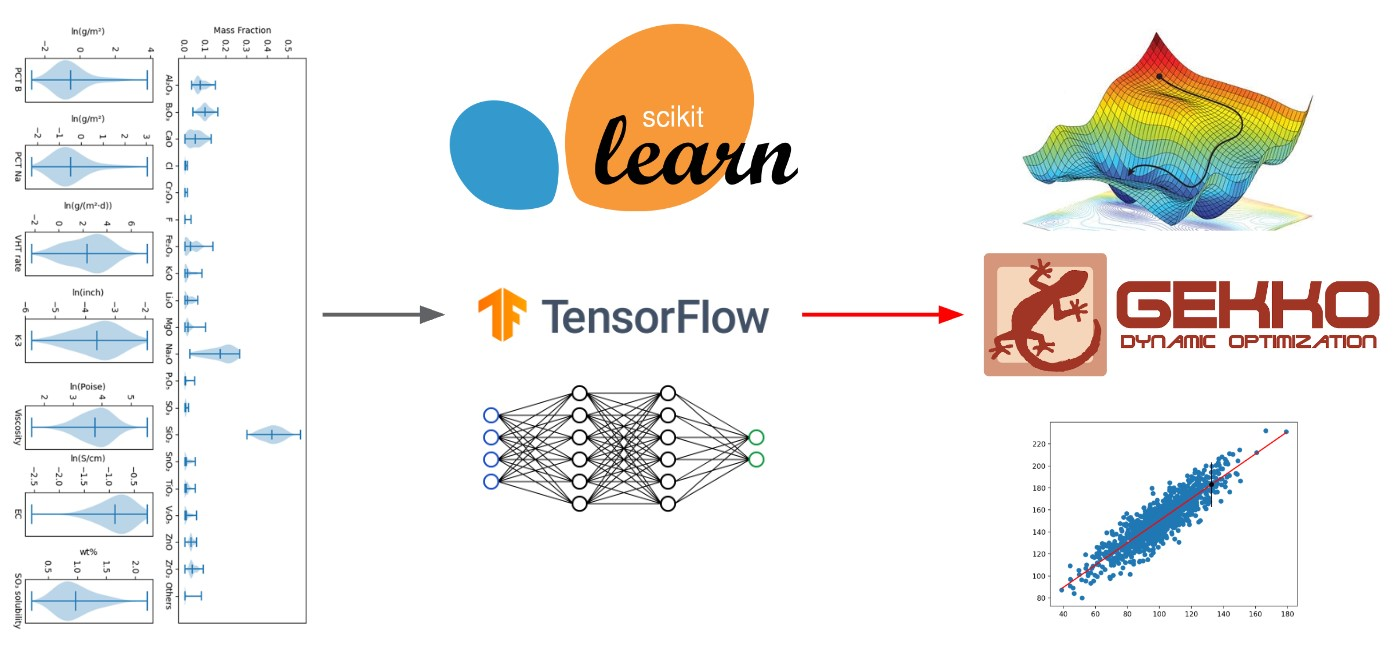Projects.VitrificationNuclearWaste History
Hide minor edits - Show changes to markup
Added lines 9-14:
Changed line 17 from:
This project utilizes machine learning models to optimize the properties of waste glass currently produced by the Pacific Northwest National Laboratory’s (PNNL) vitrification site in Hanford, Washington. Vitrification is the process of combining nuclear waste with glass-forming materials at extremely high temperatures to create a molten glass that is easily disposed of permanently and safely. PNNL currently uses an optimization scheme with partial quadratic mixture (PQM) models to optimize properties of the waste glass with the help of additives - this might include maximizing waste loading and ensuring that safety constraints are met. Because real-world behavior does not directly match simulation, constraints such as prediction uncertainties that affect optimization must be taken into account to ensure that decisions are made with confidence.
to:
PNNL currently uses an optimization scheme with partial quadratic mixture (PQM) models to optimize properties of the waste glass with the help of additives - this might include maximizing waste loading and ensuring that safety constraints are met. Because real-world behavior does not directly match simulation, constraints such as prediction uncertainties that affect optimization must be taken into account to ensure that decisions are made with confidence.
Changed line 33 from:
Gunnell, L., Manwaring, K., Lu, X., Reynolds, J., Vienna, J., Hedengren, J.D., Machine Learning with Gradient-based Optimization of Nuclear Waste Vitrification with Uncertainties and Constraints, Processes, 10(11), 2365, Nov 2022, DOI: 10.3390/pr10112365. Article (Open Access)
to:
Gunnell, L., Manwaring, K., Lu, X., Reynolds, J., Vienna, J., Hedengren, J.D., Machine Learning with Gradient-based Optimization of Nuclear Waste Vitrification with Uncertainties and Constraints, Processes, 10(11), 2365, Nov 2022, DOI: 10.3390/pr10112365. Article (Open Access) | Documentation
Changed line 33 from:
Gunnell, L., Manwaring, K., Lu, X., Reynolds, J., Vienna, J., Hedengren, J.D., Machine Learning with Gradient-based Optimization of Nuclear Waste Vitrification with Uncertainties and Constraints, 2022.
to:
Gunnell, L., Manwaring, K., Lu, X., Reynolds, J., Vienna, J., Hedengren, J.D., Machine Learning with Gradient-based Optimization of Nuclear Waste Vitrification with Uncertainties and Constraints, Processes, 10(11), 2365, Nov 2022, DOI: 10.3390/pr10112365. Article (Open Access)
Changed line 23 from:
to:
Added lines 23-24:
Changed line 35 from:
to:
Changed line 31 from:
Gunnell, L., Manwaring, K., Lu, X., Reynolds, J., Vienna, J., Hedengren, J.D., Machine Learning with Gradient-based Optimization of Nuclear Waste Vitrification with Uncertainties and Constraints, in preparation, 2022.
to:
Gunnell, L., Manwaring, K., Lu, X., Reynolds, J., Vienna, J., Hedengren, J.D., Machine Learning with Gradient-based Optimization of Nuclear Waste Vitrification with Uncertainties and Constraints, 2022.
Changed line 35 from:
Abstract: Gekko is an optimization suite in Python that solves dynamic optimization problems involving mixed-integer, nonlinear, and differential equations. Codes from other packages, like those with machine learning (ML) algorithms, have not been implemented or interfaced into Gekko. The purpose of this effort is to integrate common ML algorithms like Gaussian Process Regression (GPR), Support Vector Regression (SVR), and Artificial Neural Network (ANN) models into Gekko, allowing it to solve optimization problems where data-based models are used. In addition, the inclusion of uncertainty quantification (UQ) within an optimization framework with ML algorithms has not been thoroughly explored, so compatible models and UQ methods are investigated in this endeavor. These methods include Ensemble methods, model-specific methods, conformal predictions, and the Delta method. A simplified optimization problem involving Nuclear Waste Vitrification at Hanford to maximize waste loading is presented for demonstration and model comparison purposes. ML models are compared against the current Partial Quadratic Mixture (PQM) model in an optimization problem in Gekko, and higher performance is observed in the ML models. The example problem shows that these tools can be used in similar industry settings where easier use and better performance is needed over classical approaches.
to:
Abstract: Gekko is an optimization suite in Python that solves optimization problems involving mixed-integer, nonlinear, and differential equations. The purpose of this study is to integrate common ML algorithms such as Gaussian Process Regression (GPR), support vector regression (SVR), and artificial neural network (ANN) models into Gekko to solve data based optimization problems. Uncertainty quantification (UQ) is used alongside ML for better decision making. These methods include ensemble methods, model-specific methods, conformal predictions, and the Delta method. An optimization problem involving nuclear waste vitrification is presented to demonstrate the benefit of ML in this field. ML models are compared against the current Partial Quadratic Mixture (PQM) model in an optimization problem in Gekko. GPR with Conformal uncertainty was chosen as the best substitute model as it had a lower mean squared error of 0.0025 compared to 0.018 and more confidently predicted a higher waste loading of 37.5 wt% compared to 34 wt%. The example problem shows that these tools can be used in similar industry settings where easier use and better performance is needed over classical approaches. Future works with these tools include expanding them with other regression models and UQ methods, and exploration into other optimization problems or dynamic control.


